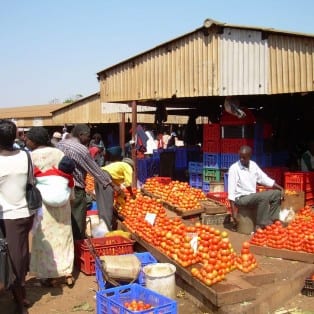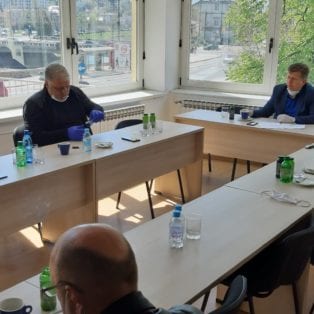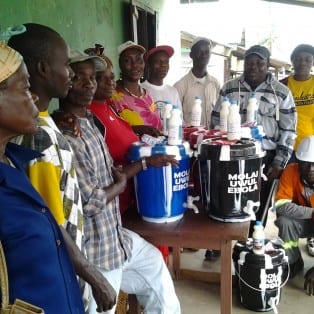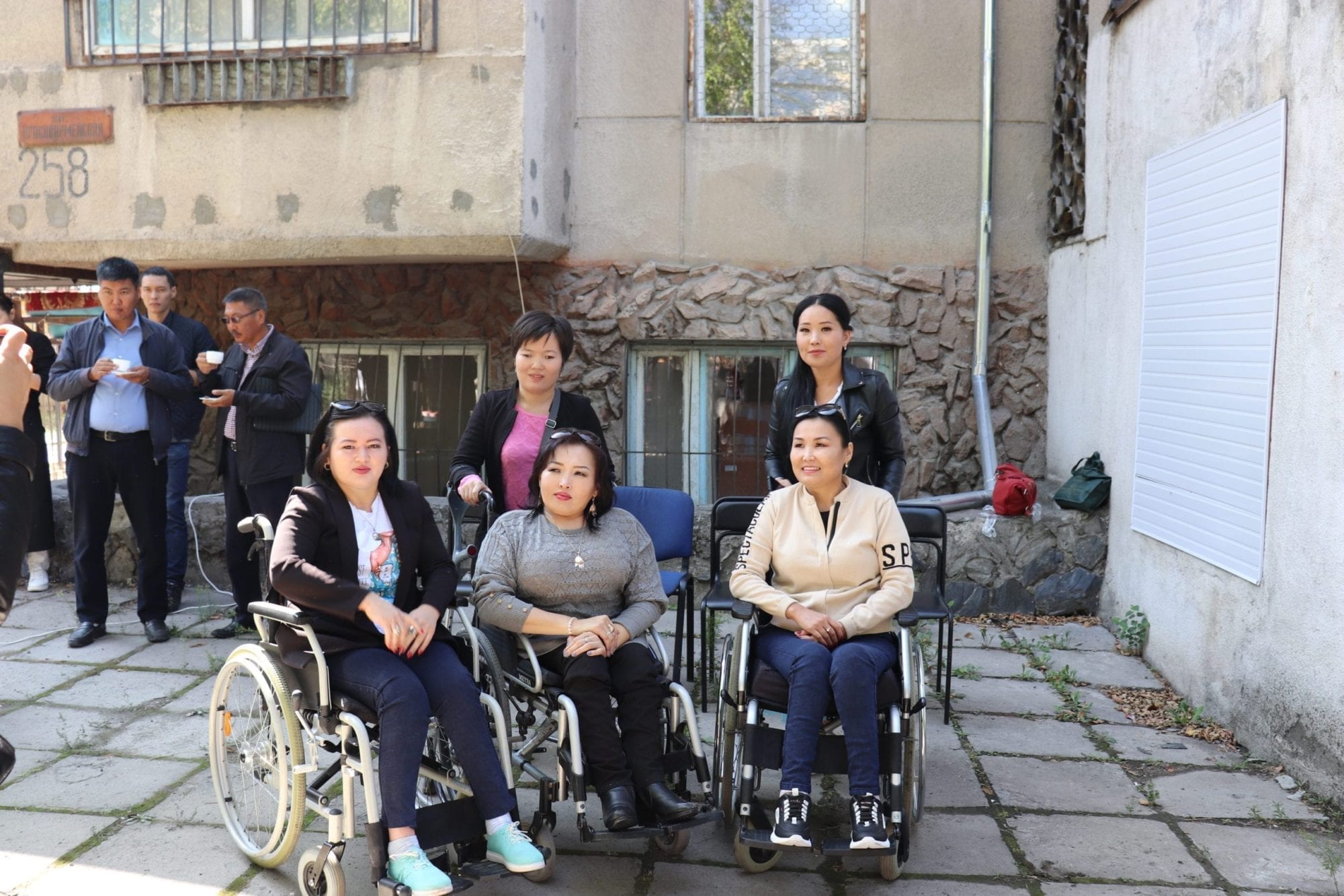
May 18, 2020
Among the world’s most vulnerable workers are those marginalized within their economies and societies, namely the women and labor migrants who predominate in the informal economy, where they perform valuable work in low-wage jobs as janitors, domestic workers, agricultural workers, home healthcare workers, market vendors, day laborers and others. Today, many of these workers are on the coronavirus front lines, risking their health without benefit of paid sick leave, COVID-19 relief programs or personal savings. Others are working where they can, if they can, to survive.
Although more than 2 billion workers globally make their living in the informal economy and can create up to half of a country’s GDP, they have limited power to advocate for living wages and safe and secure work, and never more so than during the current pandemic when informal-sector workers are disproportionately falling through the cracks. Due to the failure of governments to build systems of universal social protection, the world is facing the pandemic with 70 percent of all people lacking a safety net, says International Confederation of Trade Unions (ITUC) General Secretary Sharan Burrow. Also, despite their vast numbers—61 percent of the world’s workers work in the informal economy and, in developing countries, that number can rise to 90 percent of a country’s workforce—informal-sector workers are consistently overlooked by legislators and policy makers for economic assistance and legal protections during the current crisis.
A new brief from the UN’s International Labor Organization (ILO) warns that workers earning their livelihoods in the informal economy in 2020 are being forced “to die from hunger or from the virus” and offers a raft of immediate, medium- and long-term recommendations for governments and employers’ organizations to address the crisis. Without urgent action, quarantine threatens to increase relative poverty levels in low-income countries by as much as 56 percentage points, according to the brief.
The far-reaching effects of the coronavirus pandemic have expanded global calls for a new social contract by worker rights organizations that are championing a “build back better” campaign as well as by some businesses that recognize the unsustainability of economic and social structures in which workers absorb the burdens of our economies but not the benefits.
Unions and worker rights activists are stepping into the breach, giving voice to workers’ struggles during lockdown, providing relief where resources allow and banding together to urge governments to provide financial and other social support for informally employed workers, as well as protection from harassment.
- The Central Organization of Trade Unions-Kenya (COTU-K) distributed protective gear, such as masks, gloves, soap and hand sanitizer to workers before shops were closed, and has met with the Kenyan government to lobby for support for informal workers, who comprise some 80 percent of the workforce.
- In Zimbabwe, informal economy association ZCIEA is giving voice to vendors’ struggle for survival under quarantine and advocating for their right to operate. In Harare, even though markets are legally open and deemed essential for citizens to secure food, ZCIEA Chitungwiza Territorial President Ratidzo Mfanechiya says that ZCIEA has had to intervene with the town manager, town council and local police to protect Jambanja market vendors’ right to operate free of harassment and forced removal during the five-week lockdown. She is also speaking out against gender-based violence, given that many women are reporting incidents of abuse while trapped at home with partners during lockdown.
- The Alliance Against Violence & Harassment in Jordan, a Solidarity Center partner, is urging the government to grant assistance to migrant workers, who have little or no pay but cannot return to their country of origin. The Alliance also asks for safety gear for migrant workers still on the job. The domestic workers solidarity network in Jordan shares information on COVID-19 and its impact on workers in multiple languages on its Facebook page.
- Leaders of multiple women’s worker rights movements banded together in May to make a joint call on the world’s governments to collaborate at all levels with domestic workers, street vendors, waste pickers and home-based workers during the COVID-19 crisis so that some of the world’s most important systems traditionally propped up by informally-employed women—including food supply, the care economy and waste management—are preserved.
- In India, where an estimated 415 million workers, or 90 percent of the country’s total workforce, toiled in informal-sector jobs in 2017–18, trade unions lobbied Labor Minister Santosh Gangawar for income support and eviction support for more than 40 categories of informal workers hit by the coronavirus pandemic.
In 2018, the workforce in informal employment in Africa was 86 percent; in Asia and the Pacific and the Arab states, 70 percent; in the Americas, 40 percent; and in Europe and Central Asia, 25 percent.

May 15, 2020
As the COVID-19 crisis deepens in Ukraine and scandals are alleged regarding state procurement of personal protective equipment (PPE), worker rights activists are leveraging trade unions’ collective power to advocate for better pay and conditions for working people and help provide emergency relief during quarantine. The country’s trade unions are persisting in delivering help and calling out injustices—no small task given that Ukraine last year was awarded the worst labor rights score in Central and Eastern Europe.
Worker-initiated advocacy measures include:
- Civil society activists and the five major trade unions of Ukraine that represent 7 million members continue to resist proposed changes to the country’s labor law, which, in violation of international labor law, would allow employers to fire workers for any reason and drastically reduce overtime pay.
- Ukraine’s construction workers’ union began a collective bargaining process to minimize the negative effects of the pandemic on the construction sector and initiated a criminal case against construction company Prosco for wage theft.
- Trade union activists are speaking out on behalf of an emerging small entrepreneurs’ movement that is protesting disproportionate government support for larger, mostly oligarchy-owned, businesses during the lock down, and demanding equal support for small and micro-businesses, including small-scale farms.
- Workers at Ukraine’s postal and delivery service Nova Poshta successfully lobbied their employer to provide all 30,000 Nova Poshta employees with PPE when needed and preserve the wages and benefits of those required to stop working during quarantine.
- The Federation of Trade Unions of Ukraine, FPU, on April 29 provided a live-streamed question-and-answer forum for labor leaders from Kharkiv, Kryvyi Rih, Poltava, Lviv, Zaporizzhya, Ternopil, and Kamyanske to consult with FPU experts about worker’s legal rights under Ukraine’s labor law during the pandemic, and to share their members’ most commonly reported violations—including overwork, employer pressure to take unpaid leave and issues around telework.
- Leaders of the Confederation of Free Trade Unions of Ukraine, KVPU, on April 30 held a live-streamed conference with representatives of the medical workers’ union, rail workers’ union, independent unions of Donetsk region, the LEONI Wiring Systems union and others to catalog and discuss challenges reported by workers at home and on the job due to the pandemic—including job losses at shuttered mines in the Donetsk region, lack of PPE for medical workers and the uneven impact of quarantine on women.
- Trade unions in the Dnipro region successfully lobbied employers, local government and volunteers for increased support of medical workers at the frontline of the COVID-19 fight.
- Tower crane operators in Lviv held a wildcat strike, refusing to work until they receive their February and March wages and employer-provided PPE.
- Following an appeal from workers at the Kremenchuk machine-building plant, the local government in Poltava province allocated an additional $14,600 for medical worker needs, including face masks.
Worker-initiated relief measures include:
- Labor Initiatives (LI), a Solidarity Center-supported Ukrainian non-profit organization, is providing legal assistance to workers by distributing COVID-related information through its phone hotline, website, Facebook page and other social media. LI’s hotline provided some 100 consultations during the country’s first week of quarantine; its website FAQ on labor rights during the quarantine was viewed more than 60,000 times in March.
- The Trade Union of Healthcare Workers of Ukraine (HWUU) launched a hotline to collect and respond to emergencies reported by frontline healthcare workers, which include inadequate PPE and excessive workloads due to layoffs.
- Trade union members at Nova Poshta launched a COVID-19 email help line, provided disinfectants and children’s educational materials to all its members, and distributed 1,000 face mask vouchers to members deemed most at risk from COVID-19.
- The trade union representing workers employed by the Naftogaz state energy enterprise collected $300,000 for local healthcare worker needs, which was distributed to workers at 21 hospitals and 26 urgent-care centers.
- Also to support medical workers, the trade union representing workers employed by Ukraine’s Rivne Department of Culture collected $2,000 while the Rivne province union solidarity fund donated $50,000.
- Members of the trade union representing workers at oil-transporting company Ukrtransnafta distributed 2,256 food baskets to elders in need at a cost of $31,500.
- Unions in Pavlograd purchased 20 medical ventilators for hospitals in Pavlograd, Pershotravensk and Ternivka, and purchased $112,000 of PPE.
- KVPU-affiliated trade union activists at Antonov aircraft company helped ensure the safety of workers who are transporting medical equipment and PPE globally, including to COVID-19 hotspots.
- The trade union representing nuclear sector workers in Ukraine donated its entire reserve fund of $38,500 toward the purchase of PPE and relief for medical workers.
- Nuclear sector workers in Mykolaiv province collected $7,300 for medical workers at Yuzhnoukrayinsk hospital.
- The local chapter of the industrial workers’ union in the city of Kryvyi Rih organized self-manufacture of face masks for its members and others, producing more than 1,000 masks through March.

May 9, 2020
The parliament of the Bosnian Federation entity has proposed a labor law amendment that, if enacted, would give employers the authority in any future state of emergency to enact mass layoffs, slash hours and cut many workers’ pay to the minimum wage.
The labor federation in the entity, SSSBiH, adamantly opposes the proposed amendments because they clearly favor employers at the expense of workers during any future state of emergency.
If the text of the draft law is sent to parliamentary procedure, the labor federation said it would “take all necessary actions” to prevent its adoption.
The labor federation’s statement included the following summarized points:
- The proposed amendments were written behind closed doors without worker consultation.
- The claim that workers’ rights are protected by the obligation for employers to consult with unions is frivolous.
- The text of the proposed amendments envisages reduction of worker’s wages by the employer’s unilateral decision during a state of emergency.
- The amendments include provisions on paid leave without defined compensation, forced unpaid leave and at-will firings by employers, but do not provide increased compensation for essential workers who are exposed to infection during a pandemic.
“In the recent emergency, essential workers, including those in health care, were required to work without sufficient protection for their health. Many became sick on the job, and some died. Parliament should concentrate on setting standards all employers must meet in any future emergency to protect front-line workers, rather than enabling employers to lay off staff, cut pay and slash hours.” says Solidarity Center Europe/Central Asia Director Rudy Porter.
The federation’s full response to the proposed labor law amendments can be found here.

Apr 9, 2020
The National Health Workers Union of Liberia (NAHWUL) warns that healthcare workers and other citizens are at increased risk as President George Weah’s increasingly unpopular administration continues to shed public-sector jobs—including 448 healthcare workers last month—even as the COVID-19 pandemic gathers steam. As of April 5, 2020, Liberia is reporting 13 confirmed cases and three deaths, which NAHWUL says includes one healthcare worker’s confirmed diagnosis and the death of another.
“This is no time to reduce medical capacity, especially during a global pandemic,” said NAHWUL Assistant Secretary-General, Deemi T. Dearzrua, adding that the union is concerned not only about the livelihoods of its members and their dependents, but the lives of citizens needing medical care.
NAHWUL reports that 448 of its members—or almost 4 percent of the union’s membership—last month were forced to leave their jobs and accept a pension without the legally-required notice period and even though they did not meet the criteria for forced retirement. Under the law governing public sector workers in Liberia, workers are entitled to three-months’ notice and are not eligible for compulsory retirement until age 65 or completion of 25 years’ service. Those who lost their jobs include doctors, nurses and pharmacists.
“Nobody knew the jobs were gone until our pensioned-off members called to inquire about their unpaid February pay,” said Dearzrua, adding that the union needs government to communicate with NAHWUL about changes affecting its members.
NAHWUL says the capacity of its remaining members is also at risk because they are being expected to report for work without adequate personal protective equipment (PPE), training on how to safely treat contagious patients or government-provided COVID-19 information. During the 2014-2016 Ebola outbreak, Liberia lost 8 percent of its doctors, nurses and midwives to Ebola. A 2015 WHO survey found that healthcare workers in three West Africa countries were between 21 times and 32 times more likely to be infected with Ebola than people in the general population.
The Liberian government has not paid many public-sector workers’ February and March salaries, including those of healthcare workers, whose salaries were reduced last year under a so-called wage harmonization program. The salary-reduction program, which the government claims was necessitated by loan conditions imposed by the International Monetary Fund (IMF), last year led to strikes by teachers, healthcare workers and others.
In Liberia, the Solidarity Center supports NAHWUL’s advocacy for bargaining rights, conducts basic trade union training for its members and educates healthcare women workers about gender issues and their rights.

Dec 17, 2019
A salon has opened at the Center for Protection of Labor Rights for Migrant Women—a partner organization with the Solidarity Center that aims to improve access to decent jobs for people with disabilities, promote safety of workplaces, represent the interests of workers in informal employment and protect the rights of Kyrgyz workers, particularly women, who migrate for work—in Bishkek, Kyrgyzstan, where trained stylists will now be able to work. These stylists are women with disabilities who were unable to find work at regular beauty salons and despite specialized education could not secure employment.
The space for the salon is provided to the stylists at no cost. The uniqueness of this beauty salon is that while women receive their services, they can also get free advice on labor rights and legal migration.
“These women filled in documents for official employment with the help of the Center for Protection of Labor Rights of Migrant Women, said Elena Rubtsova, program specialist at the Solidarity Center Bishkek office.
“This is a very big step. Now these specialists will be able to pay into social security programs, and this is a guarantee of their ability to receive their pensions and other social benefits from the state, such as maternity benefits.”
Kyrgyzstan ratified the UN Convention on the Rights of Persons with Disabilities (CRPD) on February 7, 2019. The primary work needed for CRPD implementation will be to provide people with disabilities with access to physical therapy and rehabilitation services, increasing life expectancy among people with disabilities, providing medical and social assistance, ensuring free movement, facilitating accessible environments and promoting universal design. and expanding access for people with disabilities to education, justice and employment opportunities.
Read in Russian here.





